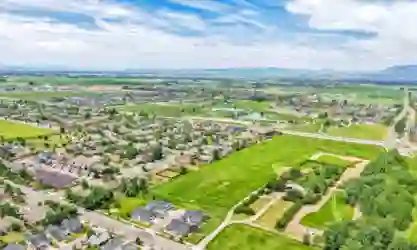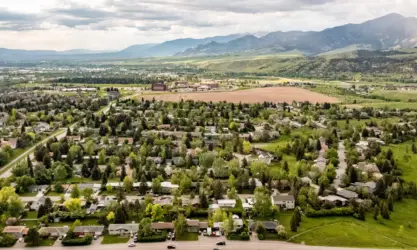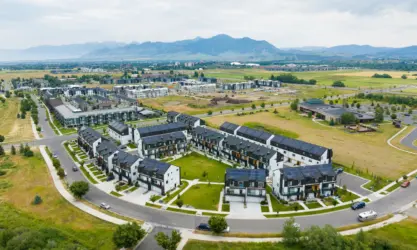View All
Bozeman Real Estate Market
Development
Bozeman Business
Bozeman Neighborhoods
Get Outside
Moving to Bozeman
Retiring in Bozeman
Just for Fun
The Selling Side
The Buying Side
Bozeman Nonprofits
Affordable Housing
Community Events
Living in Bozeman
Belgrade Real Estate
Livingston Real Estate
Manhattan Real Estate
Three Forks Montana Real Estate
Big Sky Real Estate
Moving to Montana
Home Ownership
Living in Montana
Bozeman Real Estate Group
We have never seen such an influx of people moving to Bozeman as we have in the last few years. But with that influx, there are also many people calling it quits with Bozeman. According to the U.S Census Bureau, while 11,379 people moved to Gallatin County over a 5-year period, over 8,100 people moved away. Here are five reasons people are leaving Bozeman.
1. Cost of Living
As of 2023, the cost of living in Bozeman was 22% higher than the national average. Most notably, housing costs were more than 62% above the national average, higher than Seattle, Denver, Boise and Sacramento.
With the average wage in Gallatin County still 10% below the national average, the struggle with Bozeman’s higher than average housing costs really starts to hit home. Since the pandemic, the median price of a home in Bozeman has jumped from the low $400,000’s to over $800,000 making it even harder for so many people to afford to live in Bozeman.
And of course, the rental market has been affected as well. According to Rent.com, the average rent for a 2-bedroom apartment was $2,182. For many people, the high cost of living in Bozeman has been a deal-breaker.
2. Job Opportunities
While Bozeman is becoming known as a hub for high-tech businesses, start-ups, and entrepreneurial activity, career opportunities in the area are still limited especially compared to larger metropolitan areas. Major companies like Schedulicity, Simms, and Oracle are all based in Bozeman and bring a large number of jobs to the area. But for higher-wage positions, the competition can be stiff. Not only does Montana State University churn out more than 3,481 graduates each year (as of the 2021-2022 academic year) but college graduates from other universities are also drawn to the area which means that the competition can be high for positions that require a college degree.
According to the Prospera Economic Profile, 63.8% of Bozeman residents are college-educated, compared to 46.6% in Bend, Oregon, or 43.7% in Boise, Idaho. Because Bozeman has such a highly qualified workforce, many workers find themselves underemployed, eventually leaving Bozeman in search of better opportunities for career advancement and higher-paying positions.
But for those looking for positions in retail or service industries in Bozeman the scales are tipped towards the employees. There is such a shortage of service industry workers in Bozeman at the moment that many businesses have been forced to reduce their hours or close altogether.
3. Wages
Bozeman is a highly educated area. And while a highly educated workforce is great for the city, it does mean that many people who hold a degree may end up underemployed. While Bozeman’s tech scene is growing, tourism is still a major part of our economy and our job market. In Bozeman, it is not uncommon at all to find people with higher education degrees working as servers, store clerks, and raft guides.
Bozeman is also becoming a great incubator for entrepreneurial activity and start-up businesses which bring a number of new jobs to the area. But, as stated by the Bozeman Area Labor Report, younger and smaller businesses do tend to pay less than established, larger companies.
Migration patterns show that many of the people leaving Bozeman are moving to the Seattle-Tacoma area, Denver, Fort Collins, and Spokane. While these people may be leaving Bozeman for a number of reasons, high numbers of residents moving to these urban areas do lead to the assumption that higher wages are a factor.
According to Bloomberg, Bozeman is at the top of the list of cities with highly paid entry-level jobs. And statistics from Indeed.com show that most low-wage jobs are higher than the national average, but for so many people it’s still not enough to be able to afford the high cost of living in Bozeman.
4. The Weather
While the majority of people living in Bozeman take part in some kind of winter sport, there are a number of people living here who really don’t like winter, at all. And if we’re being honest, Bozeman is a pretty tough place to live if you don’t like cold temperatures and lots of snow. Winter in Bozeman can begin in September and last until May, and while the area is known for its sunny “bluebird” days, the temperatures can drop well below zero for weeks at a time.
After a particularly tough winter, we often see a handful of people selling their homes to move somewhere with milder winters. According to the U.S Census Bureau, Washington is the top out-of-state destination for people leaving Bozeman, followed by Oregon, Colorado, and California.
5. Bozeman Is Not What It Used to Be
Before Bozeman was listed on just about every best place to live, to retire, to visit, to ski list out there, it was just a quiet little town that was bypassed by visitors on their way to visit Yellowstone National Park. Now, Bozeman is known as “Bozeangeles” to the rest of the state, and while our economy is thriving the city is experiencing many growing pains.
Bozeman is not what it was 20 years ago and for some people that is reason enough to leave. According to the U.S Census Bureau, 43% of the people leaving Bozeman are moving somewhere else in Montana. Missoula County was the most popular, followed by Lewis and Clark County (Helena) and Flathead County (Kalispell/Whitefish area).
While Bozeman’s urbanization is drawing so many people in, it’s also the same reason that is driving many people out. If you are one of those people, click here for 10 Montana towns to escape the Bozeman boom.
Click here to find out who is moving to Bozeman, Montana. Or just for fun, click here to read the 10 Things You Should Know Before Moving to Bozeman.
Want more?
Development in Bozeman | Selling Your Home in Bozeman | About Us



